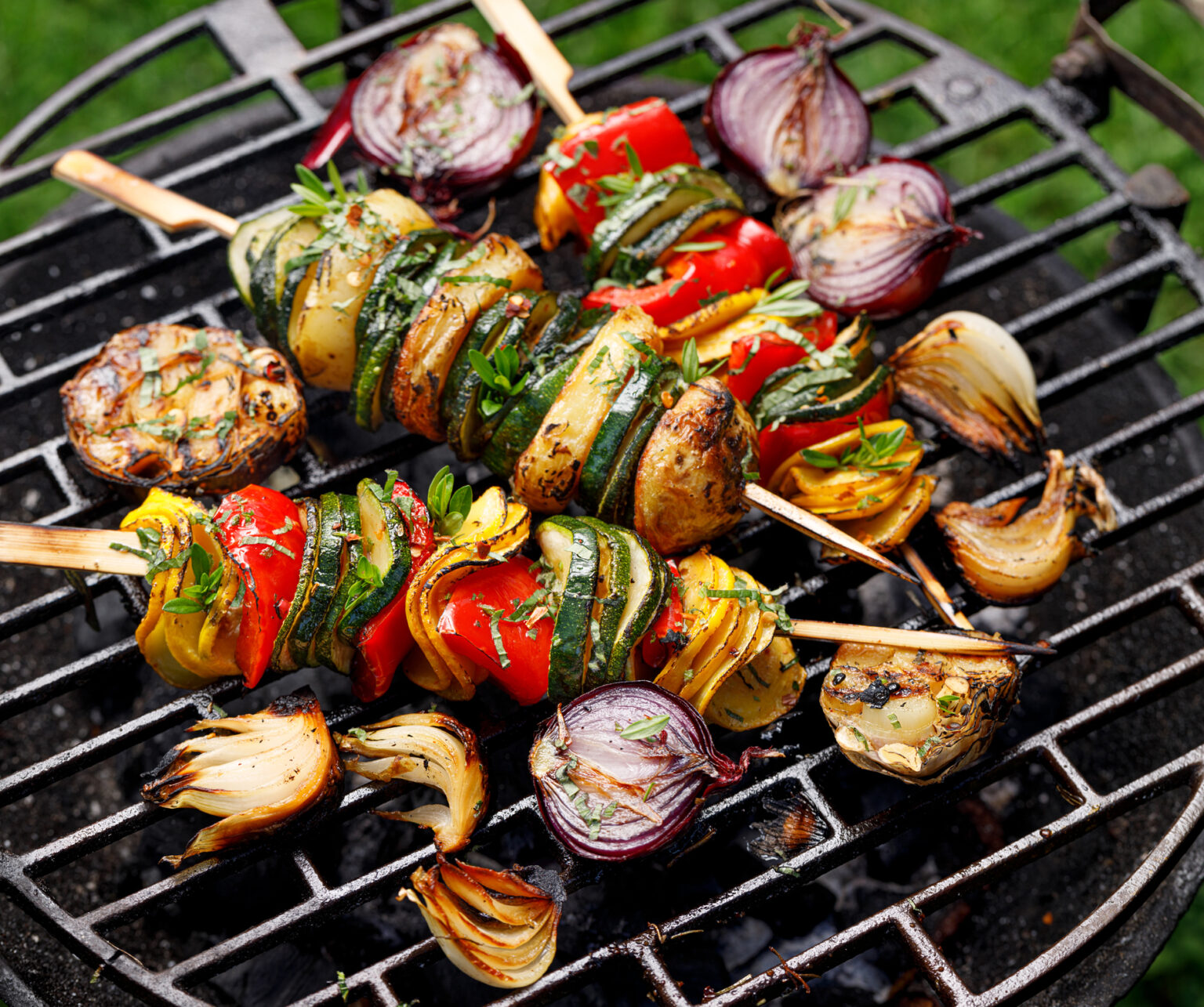Summer Grilling: How to Lower Your Health Risk
August 9, 2022
By Rosemary Weaver, MPH, RDN, LDN
NCH Registered Dietitian

Ahh…the last full month of summer is upon us – complete with warm, sunny weather and the enticing aroma of foods being grilled outdoors. Whether you are a backyard grill-master, tailgating chef or just a fan of the BBQ, you may not have considered the health risks associated with consuming meats cooked at very high temperatures. What are those risks, and is there a way to grill in a more healthful way?
Cooking animal meats at high temperature creates compounds that have been linked to cancer promotion. These compounds – polycyclic aromatic hydrocarbons (PAHs) and heterocyclic amines (HCAs) form when beef, pork, poultry or fish are cooked over an open flame or using other high temperature methods. It’s high heat that creates HCAs – the visible black char that appears on grilled food and the coating that accumulates on gas grates over time. Fat dripping on hot coals or wood creates smoke containing PAHs, which are mixtures of environmental pollutants and carcinogens. The smoke, in turn, coats the meat with these potentially carcinogenic compounds. PAHs are a risk whether you are grilling or smoking meats, even though smokers cook at a lower temperature. HCAs and PAHs have been shown to damage DNA according to animal research. While there is no definitive link between these compounds in cooked meat and cancer in humans, evidence has been accumulating.
To reduce health risk: first make a smart grilling decisions. Diets high in red meat (beef, lamb, pork) are linked to increased risk for colon cancer, regardless of how you cook it. And even smaller amounts of processed, high fat meats (hot dogs, sausages) ramp up the risk. The American Institute for Cancer Research recommends limiting beef, pork and lamb to 18 oz. of cooked meat per week and avoiding processed beef, pork or lamb products such as ham, bacon, hot dogs or sausages. Get creative with fish and chicken, using spices, herbs, hot peppers, etc. to liven up pieces of white meat. In addition, try barbequing more plant foods. Grilled vegetables and fruits are delicious, don’t form HCAs when they are cooked and play a major role in a cancer protective diet. Aim to make half your plate vegetables and you’ll cut down on the amount of meat you’re eating in general.
Next, marinate: Marinating meat, chicken or fish reduces charring, which can reduce the formation of HCAs.
Here are additional suggestions to reduce health risk:
Pre-cook: Partially cooking meat in a microwave before grilling reduces exposure time to high heat and decreases formation of HCAs and PAHs. PAHs are deposited onto the meat by smoke, so reducing the amount of time meat spends exposed to flame can also reduce the PAHs you generate and ingest. Put partially cooked protein foods on the preheated grill immediately to protect you and your loved ones from bacteria that cause food-borne illness.
Keep it low: Cook protein foods over a low flame to keep burning to a minimum. Reduce flare-ups by avoiding fats and juices contacting the fire; avoid direct exposure of meat to open flames and have a spray water bottle handy to douse flames ignited by fat. To further prevent flare-ups, prepare meat for the grill by cutting off visible fat ahead of time. Move charcoal to the side and your meat to the center of the grill. Flip your meat frequently. Be sure to cut off any charred portions of meat before serving.
Avoid direct exposure: Line the grill with foil perforated with holes. Wrap fish in foil and place it on the grill. Grilling seafood produces less carcinogenic compounds because it generally contains less fat and cooks faster.
Clean it up: Be sure to clean grill grates after each grill use to keep harmful chemicals from sticking to your food. After scrubbing with a wire brush, follow by wiping down the grates with a damp, clean cloth or paper towel to prevent dangerous wire brush particles from getting into foods.
Enjoy meals cooked outdoors during these lingering summer days by keeping you and your family safe.
Here’s a plant-based grilled recipe to try, courtesy of Aramark and the American Heart Association:
GRILLED PORTOBELLO MUSHROOM BURGER WITH BBQ ONIONS
Hearty and tasty, you won’t miss the meat on this burger! These savory Portobello mushrooms absorb the flavors from the grill.
(Serves 6)
Ingredients:
- 1 tsp. olive or vegetable oil
- 1 1/4 cup yellow onion, peeled and chopped
- 1/2 cup bottled BBQ sauce (reduced salt preferred)
- 4 large (about 14 oz.) Portobello mushroom caps (no stems), cleaned
- Cooking spray
- 1/4 tsp. garlic powder
- 6 hamburger buns (preferably whole-grain)
- 6 green leaf lettuce leaves, washed
- 12 tomato slices
- Directions:
- In sauté pan over medium-high heat, heat oil and add onion. Sauté until translucent, 3 to 5 minutes.
- Add BBQ sauce to onions and mix well. Bring to a boil. Reduce heat. Simmer 1 to 3 minutes. Turn off heat. Cover and keep hot for service.
- Preheat char-grill to medium-high.
- Coat mushrooms with cooking spray; sprinkle with garlic powder.
- Grill mushrooms until fork-tender, 3 to 4 minutes on each side. Remove from grill and slice 1/4 inch.
- Top hamburger bun with sliced mushrooms, 2-3 tablespoons BBQ onions, lettuce, and tomato. Serve.
Nutrition Facts: Calories 230, Total Fat 2.5 g, Saturated Fat 0.5 g, Cholesterol 0 mg, Sodium 520 mg (less if use reduced-sodium BBQ sauce) Carbohydrate 46 g, Protein 8 g, Dietary Fiber 4 g (more if use a whole grain bun)